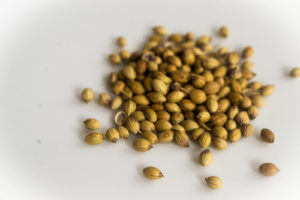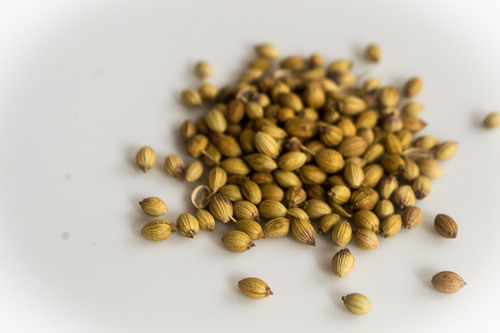Short Answer:
Yes, Coriander is Paleo!
Herb and Spice in One
Also known as cilantro or Chinese parsley, coriander is an annual herb in the family Apiaceae. All parts of coriander are edible and both the fresh leaves and dried, ground seeds are used as herb and spice in cooking. The taste of coriander leaves is soapy to most people and the seeds have an earthy, lemony flavor. It is most popularly used in pickling, curries and spice blends.
Coriander is one of the oldest herbs and spices and its origin dates back to 5000 BC. It is most popular in Indian cuisines and is often used in preparation of garam masala and curries. The slight citrusy flavor of coriander makes dishes taste a little sweeter. Coriander can also be paired with anything from salad dressing to barbecue rub.
Nutritional Facts on Coriander
Like many other herbs and spices, coriander contains fair amounts of vitamins and minerals, essential oils, phytonutrients and flavanoids. The nutrients from the coriander leaves differ from the seeds. Coriander leaves are rich in Vitamins A, C and K while the seeds contain significant amounts of dietary fiber, calcium, iron, selenium, magnesium and manganese.
Health Benefits of Coriander
Spicing up your meals can do you a good favor when it comes to overall health. Coriander, like other herbs and spices offers health promoting benefits.
Anticancer Properties
Coriander is known be anti-carcinogenic. It can inhibit HCA (heterocyclic amine) formation in meats during cooking. HCA are chemicals formed when meat is cooked in high temperatures and consumption of foods containing HCA are associated with higher risk of cancer.
Antioxidant
Coriander is one of the herbs and spices that contain high amounts of carotenoids beta carotene, lutein and zeaxanthin and flavanoids quercetin and kaempferol which have antioxidant effects. Food rich in antioxidants can decrease the risk of certain diseases by preventing the damage caused by free radicals.
Blood Sugar and Cholesterol Level
Coriander is known to be anti-diabetic. It can help stimulate the secretion of insulin, thus lowering blood sugar levels. This is extremely beneficial to people suffering from diabetes. Coriander contains linoleic acid, oleic acid, palmitic acid and stearic acid which are effective in lowering the levels of cholesterol in the blood. They can also reduce the levels of bad cholererol that causes serious cardiovascular problems including atherosclerosis, heart attack and stroke.
Antibacterial Properties
The volatile oils found in the leaves of coriander are known to have antimicrobial properties and can be a natural means to fight against Salmonella, a food borne disease. Both the leaves and seeds of coriander contain dodecenal, a compound that has been tested twice effective than antibiotic in killing Salmonella.
Anti-inflammatory
One of the essential oils present in coriander is cineole. It possesses anti-inflammatory properties that can reduce swelling caused by arthritis. It is also found to be effective in reducing skin inflammation.
Blood Pressure
Consumption of coriander has shown positive effects in lowering blood pressure.
Digestive Support
The rich aroma of coriander that comes from its essential oils aids in the proper secretion of enzymes and gastric juices in the stomach that stimulates digestion and peristaltic motion. The essential oils borneol and linalool also aid in digestion, proper functioning of liver and bonding bowels, reducing diarrhea.
Bone Health
Calcium and other minerals found in coriander are responsible for healthy bones. It can help in the growth and durability of the bones, preventing degradation associated with osteoporosis.
Anti-allergy
Coriander has a strong antihistamine property that can reduce allergic reactions from plants, foods and other substances that has effect on skin. It can reduce effects of allergies and rhinitis.
Eye Health
Coriander is also rich in vitamins A and C and beta carotene which are essential for promoting good eye sight. It can reduce risk of eye problems such as macular degeneration.
Other Names for Coriander
Cilantro, Chinese parsley
What Experts Say About Coriander
Common Indian spices such as coriander, turmeric, ginger, and cinnamon have been studied pretty extensively for their health-promoting properties. One useful property is that they can reduce lipid oxidation, so using spices in cooking is a great way to protect delicate fats and cholesterol. – Chris Kresser
All you ever wanted to know about Coriander and Paleo
Chris Kresser. Health Lessons from International Cuisines: India
https://chriskresser.com/health-lessons-from-international-cuisines-india/
The Paleo Gut. Health Benefits of Cilantro and Coriander Seeds
http://thepaleogut.com/fruit-vegetables/health-benefits-cilantro-coriander-seeds/
Organic Facts. Health Benefits of Coriander
https://www.organicfacts.net/health-benefits/herbs-and-spices/health-benefits-of-coriander.html
Medical News Today. Coriander: Health Benefits and Nutritional Information
http://www.medicalnewstoday.com/articles/299739.php
Paleo Porn. Is Coriander Paleo?
http://paleoporn.net/q/is-coriander-paleo/
Did we miss anything?
Comment below and let us know what you think. Do you agree with our conclusion?
photo credit: Emily Barney Whole Coriander Seed

